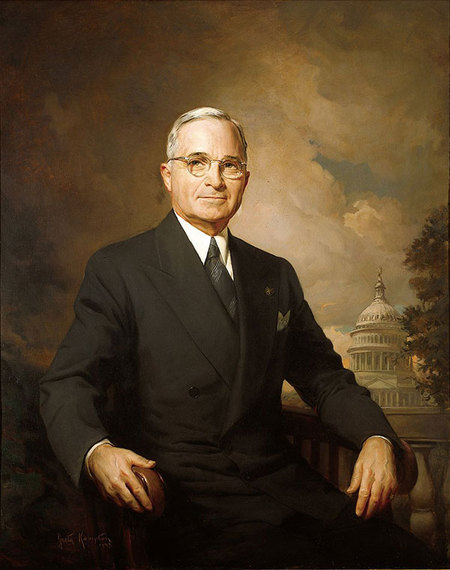The Truman Doctrine Resulted In
On May 22, 1947 President Harry Truman signed the formal "Agreements on Aid to Greece and Turkey," the central pillars of what became known equally the "Truman Doctrine." Though the principles of the policy were get-go articulated in a speech to a joint session of Congress on March 12, 1947, information technology took two months for Truman to line upward the funding for Greece and Turkey and go the legislation passed through Congress.

In his March address, Truman reminded his audience of the recent British announcement -- a alert, actually -- that they could no longer provide the primary economic and military support to the Greek government in its fight against the Greek Communist Party, and could not preventing a spillover of the conflict into Turkey. Truman asserted that these developments represented a seismic shift in post-state of war international relations. The U.S., he declared, had to pace frontward into a leadership role in Europe and around the world. Nations across the world, as he put it, were confronted with an existential threat. They thus faced a fundamental choice nearly whether or not states "based upon the will of the majority" with regime structures designed to provide "guarantees of individual liberty" would continue. If unsupported in the face of anti-democratic forces, a style of life "based upon the volition of a minority [might exist] forcibly imposed upon the majority", a government orientation which he contended depended on "terror and oppression."
Ultimately, the "foreign policy and the national security of this land," Truman reasoned, were at stake in the global conflict over democratic governance and thus in the particular tenuous situations confronting Greece and Turkey.
The fates of the two states were intertwined. Both nations had received British aid, he said. If Turkey and Greece faltered, or "fell" to communists, then the stability of the Center Due east would be at risk; thus U.Southward. assistance also was "necessary for the maintenance of [Turkey'south] national integrity."
The president therefore made the ambitious proposal that was elemental to his "doctrine": thereafter "it must be the policy of the The states to back up free peoples who are resisting attempted subjugation by armed minorities or past outside pressures." Truman requested $400 million in help for the two nations, in a move that many at the time -- and about subsequent scholarship -- depicted every bit marker a sort of de facto onset of the Cold War.
While transformative, the precise significance of Truman's spoken communication is a subject of debate. As Historian John Lewis Gaddis has argued, "despite their differences, critics and defenders of the Truman Doctrine tend to hold on two points: that the president's statement marked a turning bespeak of key importance in the history of American foreign policy; and that U.S. involvement in the Vietnam War grew logically, even inevitably, out of a policy Truman thus initiated."
Nevertheless, Truman'southward speech and authorization of funding on which the principles depended was neither a subtle nor a decisive shift toward the strategy of containment as many subsequently politicians and scholars have surmised. As Martin Folly observes in a superb piece on Harry Truman in the Oxford Encyclopedia of American Armed forces and Diplomatic History: "It is easy to see the Marshall Program for European economic recovery as following directly from the Truman Doctrine." Folly goes on to note that this association is wrong. There is little evidence to support a claim that Truman or his powerful then-Undersecretary of State Dean Acheson conceived of the Doctrine as a first step toward, for instance, the measured merely firm anti-Soviet resolution showed in the U.S. response to the Berlin Crisis (in the form of the Berlin airlift) nor was the doctrine directly linked to the Marshall Plan as information technology developed in the year to come. Yet, equally Folly suggests, the Doctrine "reflect[s] Truman'due south ain arroyo to strange affairs as information technology had evolved, which was that the United states of america needed to act positively and decisively to defend its interests, and that those interests extended well beyond the Western Hemisphere."
The major ideological shift represented by the Truman Doctrine and the assist to Greece and Turkey is its simultaneous rejection of the long-standing injunction to "steer clear of foreign entanglements" and an embrace of a heightened expansion of a sphere of influence logic. For the beginning time in U.S. history, the nation'due south peacetime vital interests were extended far outside of the Western Hemisphere to include Europe and, indeed, much of the world. According to Truman, it is "the policy of the United States to support free peoples who are resisting attempted subjugation by armed minorities or past outside pressures."
This new logic of pro-agile assistance and intervention to support "vital interests" (ever hotly contested, continually open to interpretation) worldwide undergirds the ways in which the United states continues to debate the nation'south internationalist also as unilateralist options abroad in Ukraine, Libya, Syria, Afghanistan, Nigeria, and elsewhere.
Wherever ane stands on debates over the "proper" U.Due south. office in the world and gimmicky geopolitical challenges, the antecedents are articulate. Afterwards 1947 American national security--and strange relations more than broadly -- were no longer premised on a limited view of protecting the political and physical security of U.S. territory and citizens. Instead, the assist understanding signed on May 22, 1947 clinched a formalized U.South. delivery to (selectively) assist, preserve, intervene, and/or reshape the political integrity, structures, and stability of not-communist nations effectually the earth. The consequences of this aid understanding were profound for the early Cold War and for the shape of international relations in the world today.
This piece was originally published on the Oxford University Printing Blog
The Truman Doctrine Resulted In,
Source: https://www.huffpost.com/entry/consequences-of-the-truma_b_5370036
Posted by: hesslockonamind.blogspot.com


0 Response to "The Truman Doctrine Resulted In"
Post a Comment